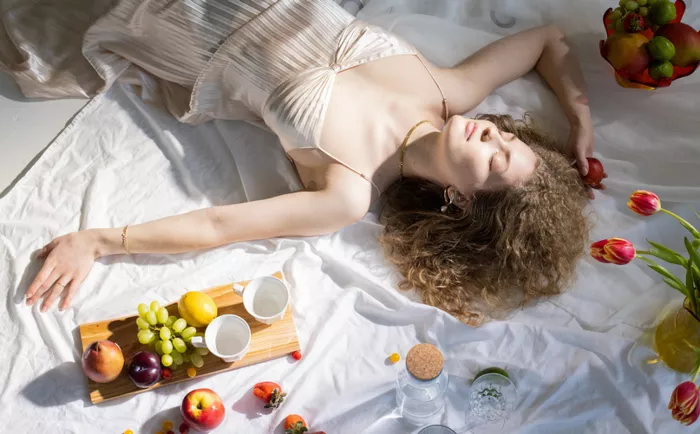Healthy, shiny hair is not just about the products you apply—it starts with what you eat. Your hair reflects your overall health, and a balanced diet rich in key nutrients can prevent hair loss, boost growth, and improve strength. This guide explores the top foods for hair health, explaining how each nutrient works and how to include them in your meals.
Protein: The Building Block of Hair
Hair is primarily made of keratin, a type of protein. Without enough protein, hair grows weak, brittle, or may even fall out.
Top Sources:
- Eggs: Packed with protein and biotin (a B vitamin critical for hair).
- Lean Meats: Chicken, turkey, and lean beef provide iron and zinc.
- Fish: Salmon and tuna offer protein plus omega-3s (more on this later).
- Legumes: Lentils, chickpeas, and black beans are plant-based protein stars.
Tip: Aim for 20–30 grams of protein per meal. Add eggs to breakfast, grilled chicken to salads, or hummus as a snack.
Iron: Oxygen for Hair Follicles
Iron helps red blood cells carry oxygen to hair follicles. Low iron levels (anemia) can cause hair thinning.
Top Sources:
- Red Meat: Beef and lamb are rich in heme iron (easily absorbed).
- Spinach: Cooked spinach provides non-heme iron. Pair with vitamin C (e.g., lemon juice) to boost absorption.
- Lentils: A vegan-friendly iron source.
- Shellfish: Oysters and clams deliver iron and zinc.
Signs of Deficiency: Fatigue, pale skin, and excessive shedding.
Omega-3 Fatty Acids: Nourish the Scalp
Omega-3s reduce scalp dryness and inflammation, promoting thicker hair.
Top Sources:
- Fatty Fish: Salmon, mackerel, and sardines.
- Flaxseeds: Sprinkle ground flaxseeds on yogurt or oatmeal.
- Walnuts: A handful daily provides omega-3s and zinc.
- Chia Seeds: Mix into smoothies or pudding.
Bonus: Omega-3s also support heart and brain health!
Vitamin A: For Sebum Production
Vitamin A helps glands produce sebum, an oily substance that moisturizes the scalp. Too little can cause dandruff; too much may lead to hair loss.
Top Sources:
- Sweet Potatoes: One medium potato covers your daily vitamin A needs.
- Carrots: Snack raw or add to soups.
- Kale: Sauté with garlic for a nutrient-packed side.
- Pumpkin: Roast or blend into soups.
Note: Stick to food sources—avoid high-dose supplements.
B Vitamins: Energy for Hair Growth
B vitamins, especially biotin (B7), strengthen hair and nails. Others like B12 and folate aid red blood cell formation.
Top Sources:
- Biotin: Eggs, almonds, and sweet potatoes.
- B12: Animal products (meat, fish, dairy) or fortified cereals for vegans.
- Foliate (B9): Spinach, avocado, and broccoli.
Myth Alert: Biotin supplements are popular, but deficiencies are rare. Focus on food first.
Vitamin C: Collagen & Iron Absorption
Vitamin C boosts collagen (a protein that strengthens hair) and helps absorb iron.
Top Sources:
- Citrus Fruits: Oranges, grapefruits, and lemons.
- Bell Peppers: Red peppers have twice the vitamin C of oranges.
- Strawberries: Add to salads or oatmeal.
- Guava: A tropical superfruit.
Tip: Eat vitamin C-rich foods with iron sources (e.g., spinach + lemon).
Vitamin D: Follicle Activation
Low vitamin D is linked to hair loss. It helps create new hair follicles.
Top Sources:
- Sunlight: 10–15 minutes of sun exposure daily.
- Fatty Fish: Salmon and sardines.
- Fortified Foods: Milk, orange juice, and cereals.
- Mushrooms: Expose them to sunlight to boost vitamin D.
Vitamin E: Protect from Damage
This antioxidant shields hair from sun and pollution damage.
Top Sources:
- Almonds: A handful daily.
- Sunflower Seeds: Sprinkle on salads.
- Spinach: Eat raw or lightly cooked.
- Avocado: Blend into smoothies or spread on toast.
Zinc: Repair and Growth
Zinc supports hair tissue repair and keeps oil glands healthy. Deficiency can cause shedding.
Top Sources:
- Oysters: Just 2 oysters meet daily zinc needs.
- Pumpkin Seeds: Roast for a crunchy snack.
- Beef: Opt for grass-fed cuts.
- Quinoa: A gluten-free grain with zinc.
Caution: Too much zinc can harm hair—stick to food, not supplements.
Selenium: Shield Against Toxins
Selenium protects hair from oxidative stress. Brazil nuts are the best source.
Top Sources:
- Brazil Nuts: 1–2 nuts daily suffice (don’t overdo it!).
- Tuna: Choose light tuna to limit mercury.
- Eggs: Also provide biotin and protein.
Hydration: Water for Hair Cells
Dehydration makes hair dry and brittle. Drink water and eat water-rich foods.
Top Sources:
- Cucumber: 95% water.
- Watermelon: A summer hydrator.
- Celery: Add to juices or salads.
Goal: Drink 8–10 glasses of water daily.
Foods to Avoid
Certain foods harm hair health:
- Sugar: Spikes insulin, which may increase hair loss.
- Processed Foods: Lack nutrients and contain inflammatory fats.
- High-Mercury Fish: Swordfish and king mackerel can disrupt hair growth.
- Alcohol: Dehydrates and depletes zinc and B vitamins.
Conclusion
Healthy hair starts on your plate. Include a variety of proteins, vitamins, minerals, and healthy fats to nourish your hair from within. Focus on whole foods like eggs, spinach, nuts, and fatty fish, and stay hydrated. While supplements can help, they’re no substitute for a balanced diet. Pair good nutrition with gentle hair care, and you’ll see stronger, shinier locks in no time!
Related topics:
What Foods Make Your Hair Grow Quicker
Best Foods for Hair Growth and Strength: What Experts Recommend
Expert Reveals Superfood for Healthy Hair in Winter


